The buoyancy compensator device is the cornerstone of a SCUBA diving rig. It holds the tank securely and assists in routing the air hoses. Its integrated weight system secures ballast weights, and the valve system keeps a scuba diver neutrally buoyant and in control when descending, ascending, and while exploring the depths. The BCD (sometimes just called a BC) is available in three basic styles: jacket, front-adjustable, and back-inflate. Determining which is the best BCD for you depends on where you’re going to use it, along with your diving style and skill level.
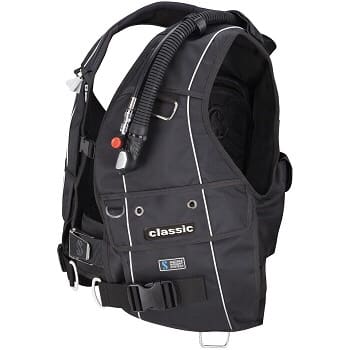
The Scuba Vest
The jacket-style BCD was diving’s original buoyancy compensator design and is still very popular among divers, from the newly certified to the veteran. Easy to use, it offers lots of lift capacity and requires minimal adjustment. When SCUBAPRO unveiled the first stabilizing or “stab” jacket over forty years ago, it revolutionized the diving BCD market. Providing unequaled stability, its unique design uses unrestricted internal passageways to allow air to flow throughout the jacket and accumulate at the highest point. This makes for a stable ride under water and a comfortable and relaxed face-up floating position on the surface. A direct descendant of the original “stab” jacket, SCUBAPRO’s modern Classic jacket-style dive BCD combines the best design and construction features of past and present. Built tough, armed with a first-class valve system and offering an outstanding buoyant lift, the Classic is the original jacket-style BCD, and still one of the best. “Stab” jacket fans include dive instructors, technical divers, commercial divers, and military divers.
The Front-Adjustable BCD
A front-adjustable BCD provides a sense of comfort and security that can transform your dive from one of trepidation to total self-assurance. With the ability to adjust shoulder, chest and waist straps to achieve the perfect fit, and with air cells positioned under your arms and around your waist, a front-adjustable BCD hugs you. An excellent example of a front-adjustable design is the Glide. Ideal for all types of SCUBA diving, when it comes to comfort, fit, and performance, this buoyancy compensator sets the bar. Its innovative Y-Fit shoulder design delivers exceptional comfort, control, and range of motion. Stable both at depth and while floating on the surface, it is popular with new divers, experienced divers who dive infrequently, and divers who like the idea of being surrounded in comfort.
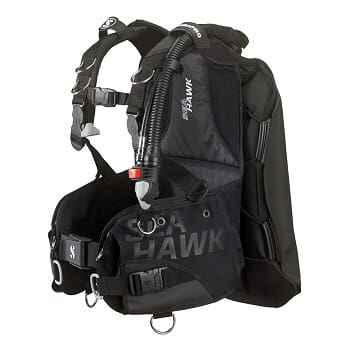
The Back-Inflate BCD
A back-inflate BCD, like the name implies, positions its air cell behind you. By doing so, front-body bulkiness disappears, leaving an uncluttered chest area, and hydro-drag is radically reduced, creating a feeling of total diving freedom. Compared to other BCD designs, this can feel like you’re diving with no equipment at all. Back-inflate BCDs, like the Seahawk 2 or the unique HYDROS PRO, considered the best back-inflate BCD, also tend to place you in the optimum swimming position at depth naturally, and wearing one you will never suffer from body squeeze. Advanced divers, travel divers and photography models are enthusiastic devotees of the back-inflate BCD. However, having your buoyancy behind you tends to push you forward on the surface and requires that you pay a bit more attention to your trim weights. This can easily be accomplished with practice, but it’s why the back-inflate BCD tends to be favored by more experienced divers.
The General-Purpose BCD vs. Travel BCD vs. Hybrid BCD
General-purpose SCUBA BCDs are loaded with comfort features like padding and neck rolls and depth-compensating cummerbunds. They also offer high lift capacities and big weight ditch systems able to hold lots of ballast weight. These BCDs are ideal for temperate to cold-water diving where thick wetsuits or dry suits are required for thermal protection. If you do most of your diving near home in lakes, quarries or high latitude oceans, these diving BCDs will do the trick. The above-mentioned Classic jacket-style and Glide front-adjustable are both excellent examples of general-purpose BCDs. Also, a good choice is the back-inflate Seahawk 2. It is built rugged for cold-water diving and offers a generous buoyant lift.
If you do most of your diving on vacation or in warm-water locales, a travel BCD would be a good choice. These SCUBA BCDs are lighter in weight, offer less buoyant lift and smaller ballast weight pouches, and they pack extremely easy. The Litehawk is a back-inflate BCD designed specifically for dive travel; so is the GO, which is built for traveling divers who prefer the fit and feel of a front-adjustable BCD.
Of course, many divers divide their diving time between excursions close to home and trips to exotic diving locales. To avoid diving locally with an under-powered travel BCD, or lugging an over-powered 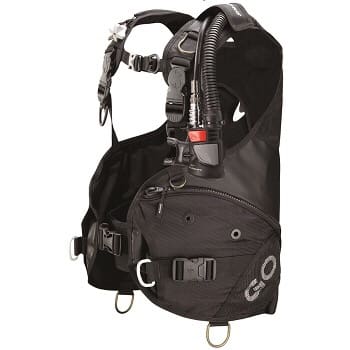
general-purpose BCD halfway around the world, some divers choose to own two SCUBA BCDs – one for home and one for vacation. Other divers opt for a hybrid BCD – a SCUBA BCD that, by virtue of its unique design attributes, can perform as well in local waters as it does in distant tropical waters.
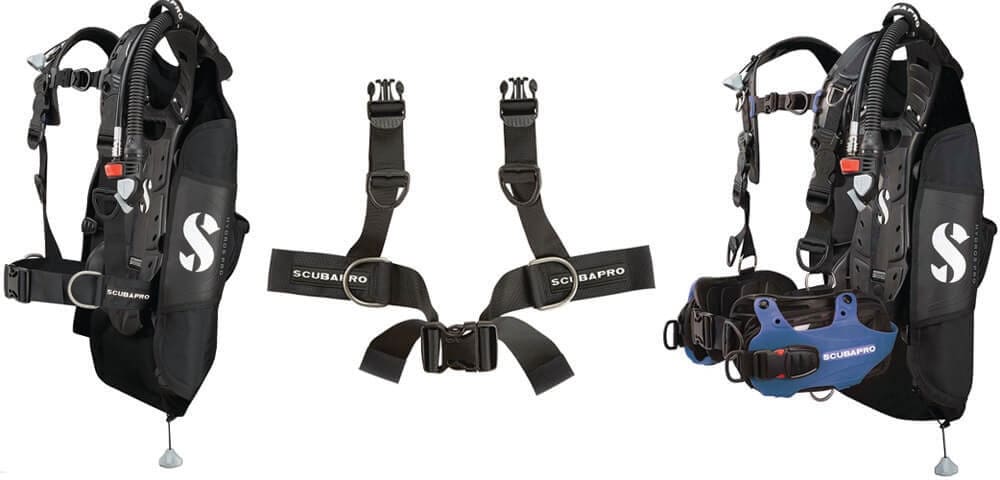
If going hybrid sounds like your kind of diving, there is no better example of a first-rate hybrid BCD than the innovative HYDROS PRO. A real breakthrough in dive comfort and convenience, the HYDROS PRO includes both a full-sized integrated weight system and Trav-Tek harness straps. With a quick switch of clips, you can transform a powerful fully weight integrated temperate or cold-water scuba BCD into a lightweight and streamlined harness travel BCD. Modular in design for a lifetime of diving and fully customizable, you simply have to see this SCUBA BCD appreciate all it offers fully. The HYDROS PRO is an incredible feat of SCUBAPRO engineering.
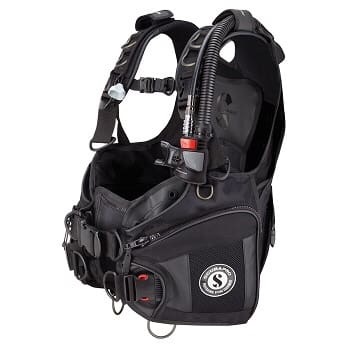
Best Women’s BCD
Buoyancy compensators are generally considered unisex SCUBA equipment. For example, the above-mentioned jacket-style Classic and back-inflate Seahawk 2 and Litehawk, as well as the front-adjustable X-Black and Equalizer, can all be worn by both male and female divers. However, women are unique in size and shape, and they often face difficulties finding a BCD that fits right, provides good stability, and is easy to control in the water. For this reason, there are buoyancy compensators available that are specifically designed, tailored, and sized for female divers. On these BCDs, you’ll find smaller air bladders, shorter inflator hoses, and curved shoulder straps, to name just a few of the modified features intended to deliver a more comfortable and secure fit while diving the depths. The Bella is an excellent example of this refined design approach. Ideal for all types of SCUBA diving, this durable buoyancy compensator outshines all other front-adjustable female-specific BCDs when it comes to exceptional comfort, fit, and performance. Moreover, for back-inflate BCD aficionados, there is the one-of-a-kind HYDROS PRO, which is also available in a model designed especially for women.
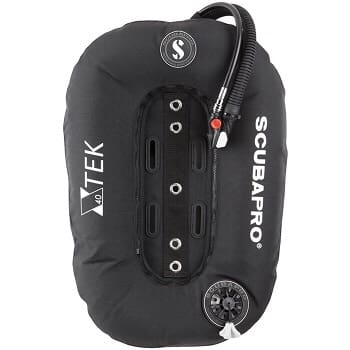
The Back Plate and Wing
While not SCUBA BCDs in the traditional sense, backplate systems perform the same important buoyancy control device tasks – they take a different approach in doing it. A standard backplate system consists of three basic components: a SCUBA back plate to hold the tank, a diver’s harness to strap the back plate to the diver, and an air cell, or dive wing, to provide the buoyant lift. Put them together, and you have a backplate system. A typical system, for example, would be an X-Tek Back Plate in either stainless steel or aluminum, an X-Tek Donut Wing air cell, and an X-Tek Form-Tek diver’s harness. While suitable for any divers, these systems are most commonly used by technical divers, and they are designed for either single or double tank configurations. They are modular, so you can mix and match the right type of back plate to the right sized wing for your type of diving, plus they are incredibly stable and offer advantages in distributing ballast weight.
Jacket-style, front-adjustable, back-inflate. General-purpose, travel, hybrid. Also, don’t forget the backplate system — lots of different choices for so many different divers and so many different diving styles.

